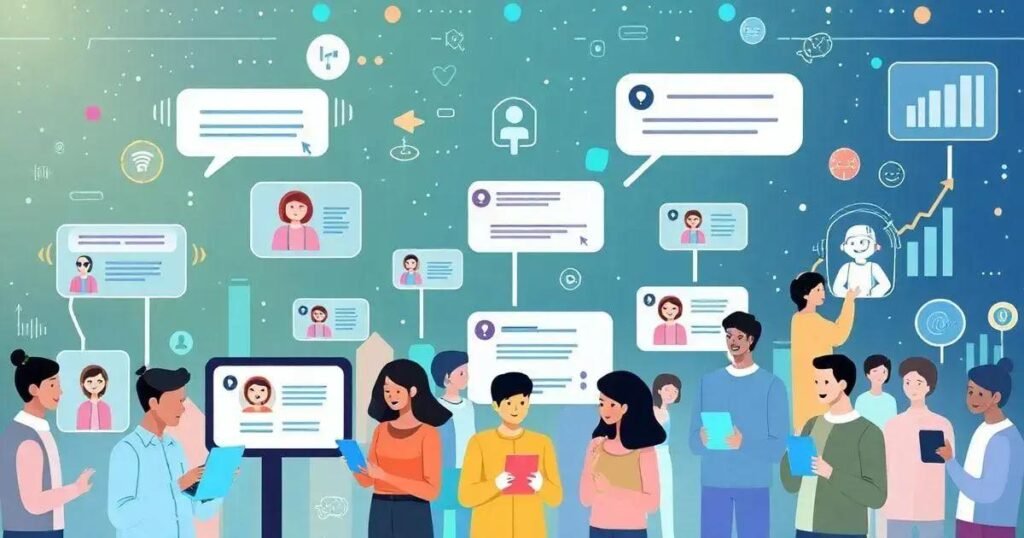Are you tired of feeling like you’re stuck in a rut when it comes to customer engagement? Do you struggle to connect with your customers and provide them with the level of service they expect? If so, you’re not alone.
In today’s fast-paced digital world, customers are more demanding than ever before, and businesses need to find new and innovative ways to stay ahead of the curve. That’s where chatbots come in.
Chatbots for customer engagement are revolutionizing the way businesses communicate with their customers, and in this article, we’ll explore the benefits and best practices for implementing chatbots in your customer engagement strategy.
Chatbots for Customer Engagement: The Game-Changer in Modern Communication
Chatbots for customer engagement are the game-changer in modern communication, offering a cost-effective and efficient way to interact with customers. With the ability to process multiple conversations simultaneously, chatbots can provide 24/7 customer support, increasing customer satisfaction and reducing the workload of human customer support agents.
By leveraging AI and machine learning, chatbots can learn from customer interactions and improve their responses over time, ensuring that customers receive personalized and accurate information. Moreover, chatbots can help businesses to analyze customer behavior and preferences, enabling data-driven decision making and improved customer experiences.
The rise of chatbots is revolutionizing customer service by providing a more efficient and personalized way to interact with customers. With chatbots, customers can quickly get answers to their questions, resolve issues, and even complete transactions.
By automating routine tasks, chatbots free up human customer support agents to focus on more complex and high-value tasks, improving overall customer service and reducing costs. Furthermore, chatbots can be integrated with existing customer service systems, enabling seamless transitions between human and automated interactions.
The benefits of chatbots in customer engagement are numerous, including increased efficiency, improved customer experience, and reduced costs. Chatbots can handle large volumes of customer inquiries, providing quick and accurate responses, while human customer support agents focus on complex issues.
Moreover, chatbots can be designed to provide personalized customer experiences, leveraging customer data and preferences to offer tailored solutions. By integrating chatbots with existing customer service systems, businesses can improve operational efficiency and reduce costs, ultimately leading to increased customer satisfaction and loyalty.
Designing effective chatbots requires a deep understanding of customer needs, preferences, and behaviors. To create chatbots that resonate with customers, businesses must focus on simplicity, clarity, and personalization.
By incorporating natural language processing (NLP) and machine learning, chatbots can learn from customer interactions and adapt to changing customer needs. Moreover, chatbots should be designed to be user-friendly, intuitive, and accessible, ensuring that customers can easily interact with them.
By following best practices and incorporating innovative technologies, businesses can create chatbots that deliver exceptional customer experiences.
Chatbots for customer engagement are being successfully implemented in various industries, from retail to finance, healthcare, and more. Case studies and real-life examples demonstrate the impact of chatbots on customer engagement, showing how they can improve customer satisfaction, reduce costs, and increase revenue.
By leveraging the power of chatbots, businesses can gain a competitive edge, improve operational efficiency, and drive growth. In this article, we’ll explore real-life examples of chatbot implementation, highlighting the benefits and challenges faced by businesses.
The Rise of Chatbots: How They’re Redefining Customer Service
Chatbots for customer engagement are revolutionizing the way businesses interact with their customers, offering a cost-effective and efficient way to provide 24/7 support.
By leveraging artificial intelligence and machine learning, chatbots can learn from customer interactions and improve their responses over time, ensuring that customers receive personalized and accurate information.
With chatbots, businesses can analyze customer behavior and preferences, enabling data-driven decision making and improved customer experiences.
The adoption of chatbots can bring numerous benefits to small businesses, from automating repetitive tasks to personalizing customer service and analyzing data.
The implementation of chatbots should be done gradually, identifying areas that can benefit immediately and conducting pilot projects to assess the efficiency of these solutions.
Success stories in different sectors show how chatbots can be a powerful tool to boost growth and improve operational efficiency.
With chatbots, small businesses can not only compete on equal footing with larger companies but also innovate and create new opportunities in the market.
Chatbots can bring numerous benefits to businesses, including increased efficiency, improved customer experience, and reduced costs.
By automating routine tasks, chatbots free up human customer support agents to focus on more complex and high-value tasks, improving overall customer service.
Moreover, chatbots can provide personalized customer experiences, leveraging customer data and preferences to offer tailored solutions.
By integrating chatbots with existing customer service systems, businesses can improve operational efficiency and reduce costs.
Designing effective chatbots requires a deep understanding of customer needs, preferences, and behaviors.
To create chatbots that resonate with customers, businesses must focus on simplicity, clarity, and personalization.
By incorporating natural language processing (NLP) and machine learning, chatbots can learn from customer interactions and adapt to changing customer needs.
Moreover, chatbots should be designed to be user-friendly, intuitive, and accessible, ensuring that customers can easily interact with them.
Chatbots for customer engagement are being successfully implemented in various industries, from retail to finance, healthcare, and more.
Case studies and real-life examples demonstrate the impact of chatbots on customer engagement, showing how they can improve customer satisfaction, reduce costs, and increase revenue.
By leveraging the power of chatbots, businesses can gain a competitive edge, improve operational efficiency, and drive growth.
The Benefits of Chatbots: Increased Efficiency and Improved Customer Experience
Chatbots can bring numerous benefits to businesses, including increased efficiency, improved customer experience, and reduced costs. By automating routine tasks, chatbots free up human customer support agents to focus on more complex and high-value tasks, improving overall customer service.
Moreover, chatbots can provide personalized customer experiences, leveraging customer data and preferences to offer tailored solutions. By integrating chatbots with existing customer service systems, businesses can improve operational efficiency and reduce costs, ultimately leading to increased customer satisfaction and loyalty.
Designing Effective Chatbots: Tips and Tricks for Success
When it comes to designing effective chatbots, businesses must focus on simplicity, clarity, and personalization. By incorporating natural language processing (NLP) and machine learning, chatbots can learn from customer interactions and adapt to changing customer needs.
Moreover, chatbots should be designed to be user-friendly, intuitive, and accessible, ensuring that customers can easily interact with them. To achieve this, businesses can use various design principles, such as using clear and concise language, providing multiple options for customer input, and incorporating visual elements to enhance the user experience.
Chatbots for Customer Engagement: Case Studies and Real-Life Examples
Chatbots are being successfully implemented in various industries, from retail to finance, healthcare, and more. For example, a leading retail company used chatbots to handle customer inquiries, resulting in a 30% reduction in customer service costs. Similarly, a major bank implemented chatbots to assist customers with account management, resulting in a 25% increase in customer satisfaction. These case studies demonstrate the impact of chatbots on customer engagement, showing how they can improve customer satisfaction, reduce costs, and increase revenue. By leveraging the power of chatbots, businesses can gain a competitive edge, improve operational efficiency, and drive growth.
Conclusion: The Future of Chatbots in Customer Engagement
The future of chatbots in customer engagement is exciting and promising. As technology continues to evolve, we can expect to see even more innovative applications of chatbots in various industries. With the ability to learn from customer interactions and adapt to changing needs, chatbots will become even more personalized and effective in providing customer service.
Moreover, the integration of chatbots with other technologies, such as artificial intelligence and machine learning, will enable businesses to analyze customer behavior and preferences in real-time, enabling data-driven decision making and improved customer experiences.
As the landscape of customer engagement continues to shift, chatbots will be a crucial tool in helping businesses stay ahead of the curve and provide exceptional customer experiences.
FAQ – Frequently Asked Questions about Artificial Intelligence in Small Business
How can task automation benefit my small business?
Task automation frees up your team from repetitive tasks, increasing productivity and allowing them to focus on more strategic tasks.
What tools can I use for data analysis?
There are many tools available, such as Google Analytics, Tableau, and Microsoft Power BI, that help collect and interpret valuable data.
What are chatbots and how do they improve customer service?
Chatbots are virtual assistants that can answer questions and resolve problems at any time, improving the customer experience and freeing up your team.
How can I personalize the customer experience?
Through data analysis, you can better understand customer preferences and offer personalized recommendations and promotions.
Why is customer feedback important?
Feedback is essential for identifying areas that need improvement and adjusting your service strategy to ensure customer satisfaction.
Is artificial intelligence accessible to small businesses?
Yes, there are many accessible and scalable AI solutions that small businesses can implement to improve efficiency and service.




